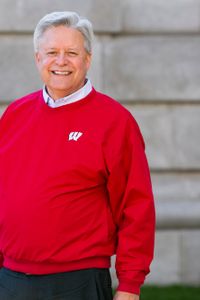Walt Stewart
Elections and appointments
Personal
Contact
Walt Stewart (Democratic Party) ran for election to the Wisconsin State Assembly to represent District 48. He lost in the Democratic primary on August 11, 2020.
Stewart completed Ballotpedia's Candidate Connection survey in 2020. Click here to read the survey answers.
Elections
2020
See also: Wisconsin State Assembly elections, 2020
General election
Democratic primary election
Republican primary election
Campaign finance
2020
Ballotpedia survey responses
See also: Ballotpedia's Candidate Connection
Walt Stewart completed Ballotpedia's Candidate Connection survey in 2020. The survey questions appear in bold and are followed by Stewart's responses. Candidates are asked three required questions for this survey, but they may answer additional optional questions as well.
Expand all | Collapse all
I have resided on Madison's east side for thirty years. I practice law and, for thirty-six years, have represented and counseled individuals, families, small businesses, and non-profit organizations. My community work includes assisting with job creation, the homeless, mentally ill, and our older residents who require programs and services to keep them in the community.
- Covid-19 illustrates how the issue of health care will be more than affordable insurance premiums, prescription drug pricing, and the Medicaid option. The system must also provide more personnel, such as nurses, and resources to assure their safety.
- Pollution of lakes and streams, particularly the PFAS problem, must be aggressively attacked.
- We are fortunate to have the university and technical college as employers, community resources, and examples for other communities to admire. They deserve our protection and vigorous support.
My three messages reflect my confidence that, with the right leadership and direction, we can greatly improve the health of our citizens and our environment. Our institutions of higher education will be the source of more and better health care workers, particularly as the population continues to age. We will need more research to understand and reduce PFAS pollution in the soil and as it enters the waters. Wisconsin has historically relied upon its institutions of higher education for research, direction, and training to tackle its problems.
Theodore Roosevelt, despite his drawbacks, offers many examples. First, he could identify weaknesses, such as his poor physique, and he worked diligently on improvement. Second, he was not afraid to take on difficult and thankless tasks, such as chairing the NYC Police Commission to root out corruption. Finally, he would challenge social norms and prejudices. He was the first President to invite a black man, Booker T. Washington, to dine at the White House.
Wisconsin Progressive. My answers above should indicate my political philosophy is grounded more in pragmatism (how to get the work done) than in ideology. Accordingly, political philosophy for a legislator should never be reduced to a single system. As a general approach to understand the human condition at the edge of society, start with anything written by Ta Nehisi Coates. "Dealing with Statutes" by the late Prof. Willard Hurst, has sections which describe the legislative objectives and process quite well. "The Politics of Resentment" is currently a necessary read. To understand the legislature's majority leadership, I would suggest "The Prince" by Machiavelli.
The ability to listen to the constituents, and then to express those concerns in the manner most beneficial to the people of the district. Characteristics which assist include experience, strong personal character, patience, and the willingness to do the work assigned to me.
The ability to listen and then comprehend the speaker's concerns. The experience of working with individuals, families, small businesses, and non-profit groups to help them achieve their objectives. The patience as a volunteer sitting on and/or leading non-profit organizations which strive to meet the needs of the community. The knowledge about how a statute can (or should) work. A high tolerance for people with whom I disagree and the communication skills to help them see another perspective.
As stated above, listen to the constituents. They believe they are in the best position to know what they need, so this should always be the starting point. Then the legislator needs to comprehend the problem, identify the law(s) most associated with the problem, envision the situation as improved, and craft the law to achieve the improvement. This is what we mean by legislating.
I recall the presidential campaign of John F. Kennedy and his election. I was five years old. My parents were politically active and we followed all the events closely.
My first job, when I was sixteen, was washing pots and cooking equipment in a hospital kitchen and delivering meals to patient wards throughout the hospital. I held the job for two years.
Again, too many to mention. Try the four volume biography (unfinished) of Lyndon Johnson by Robert Caro, or, perhaps, "Hamilton" by Chernow.
As an active musician, I have a couple hundred bouncing between my ears. Today, however, it was "Rockin' Robin," the 1958 hit by Bobby Day.
Given the current make-up, and the 2012 legislative map, I find no meaningful differences.
Of course such service is beneficial, but by no means a requirement. Many skills useful for legislating can be obtained by education, employment history, and community service. Of course, it is helpful to have some experience in how the legislature operates, its rules and procedures, but the way to get that experience is to be there.
Almost all legislation for the foreseeable future will address the consequences of the Covid 19 pandemic. The challenge will be in framing the issues to be addressed, the law applicable to the issue, and then crafting the modification or overhaul of that law so that we improve our state. Every such project, however, must take care that the burdens do not fall upon the shoulders of those least able to pay.
There system of constitutional government expects tension between the branches. The Wisconsin Governor enjoys great power, for example, in the line item veto, and that veto is rarely challenged. The Governor's agencies create significant policies and legal interpretations by administrative rules. So the legislature, irrespective of partisanship, must vigorously use its powers to control resources (taxation and budget) and to provide administrative rule oversight as checks on executive over-reach. But if the legislature believes the Governor is too timid, then it should send bills to the Governor, even at the risk of veto, to be sure the Governor gets the message.
Yes. A legislator in the minority risks being just a bench warmer. To avoid this result, the legislator must seek colleagues in the majority with similar interests or concerns. The best place to start is in committee, which is where most of the work is done. The legislator needs to know the issues, the options, and the consequences of important proposals. Use this information to become a trusted source who can reliably help to improve good legislation and to derail the junk. The legislator does not need to be of the same party to have the respect and confidence of the others. Respect and confidence will yield results across party lines.
Review of Administrative Rules. Higher Education. Aging and Long-term Care. Judiciary. Family Law. Natural Resources.
I have known many legislators, each of whom brought unique qualities and skills to the job. I would draw upon my experience and then work to become the legislator I would want as a model for others.
Note: Ballotpedia reserves the right to edit Candidate Connection survey responses. Any edits made by Ballotpedia will be clearly marked with [brackets] for the public. If the candidate disagrees with an edit, he or she may request the full removal of the survey response from Ballotpedia.org. Ballotpedia does not edit or correct typographical errors unless the candidate's campaign requests it.
See also
External links
Leadership
Minority Leader:Greta Neubauer
Representatives
Republican Party (54)
Democratic Party (45)

 = candidate completed the Ballotpedia Candidate Connection survey.
= candidate completed the Ballotpedia Candidate Connection survey.




 = candidate completed the Ballotpedia Candidate Connection survey.
= candidate completed the Ballotpedia Candidate Connection survey. = candidate completed the Ballotpedia Candidate Connection survey.
= candidate completed the Ballotpedia Candidate Connection survey.








